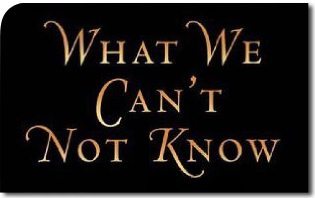 In a world where baby body parts are bought and sold and marriage has been redefined, it is urgent that we reaffirm that there are certain broad, moral truths that we can’t not know. It needs to be said and proclaimed.
In a world where baby body parts are bought and sold and marriage has been redefined, it is urgent that we reaffirm that there are certain broad, moral truths that we can’t not know. It needs to be said and proclaimed.
We all know that one should not murder. We all know that one should not steal or lie. These are all written on the human heart to the point that they cannot be blotted out. In other words, there are no excuses for not knowing. Many people may live in denial of these truths, but they nevertheless perceive the objects of their denial.
In this sense, Prof. J. Budziszewski’s book, What We Can’t Not Know: A Guide, is a refreshing oasis in a postmodern desert. This extremely logical and compelling work on natural law provides a much-needed refutation of the current assumption that moral truth is relative and even unobtainable.
His central thesis is very clear: there is an unchangeable and universal moral code based on human nature that everyone generally knows. This set of moral truths, called natural law, is “a universal possession, an emblem of a rational mind, an heirloom of the family of man.”
Formulations of this natural law have appeared in every culture, among all peoples and in all epochs. By far the most well known is the Ten Commandments, which succinctly summarizes those self-evident moral truths that should govern human action.
Unlike mutilated natural law theories from the Enlightenment, Prof. Budziszewski takes a classical and Thomistic natural law perspective that embraces as a given the existence of a Creator and the need to give Him honor. He masterfully demonstrates this by calling up what he terms the “witnesses” of natural law: “deep conscience, the witness of design as such, the witness of our own design, and the witness of natural consequences.” The result is a spectacular intellectual artifice of crystalline logic and clarity.
However, this book is not a theoretic exposition of some ideal law that has little to do with the modern world. Quite the contrary, the author actually explains the present moral crisis through the prism of natural law. He answers the obvious question: Why do so many appear not to know that which they can’t not know?
To answer this question, the author does not claim we all have an innate, detailed, and precise vision of natural law. He only says that we all have a general knowledge of basic moral truths. This knowledge requires constant development and nurturing. We must find the applications and reach the conclusions of this primary knowledge with the help of faith, tradition, culture, institutions, and moral education.
The problem with the modern world is that we have taken away so many of those institutions and means that normally help people apply natural law well. Moreover, we have adopted so many mechanisms of denial, sin, rejection, rationalization and “just plain bad living” that make living according to natural law onerous.
As a result, many fail to live inside natural law and are in denial of it. However, this denial only proves its existence since when we fail to live in accordance to our nature and design, we pay the price of misery and disaster. Driven by the guilt from our consciences, we are indicted and punished by what the author calls the “Five Furies” of remorse, confession, atonement, reconciliation, and justification. These avenging modes of conscience are “inflexible, inexorable and relentless, demanding satisfaction.”
In a world where we are told we can know nothing, we need to be told what we can’t not know. The merit of What We Can’t Not Know is that it does this so well, and in so doing perfectly describes where we went wrong in our rebellious culture. For those who are seeking a return to order, this book is one that we shouldn’t not read.
As seen on AmericanThinker.com
